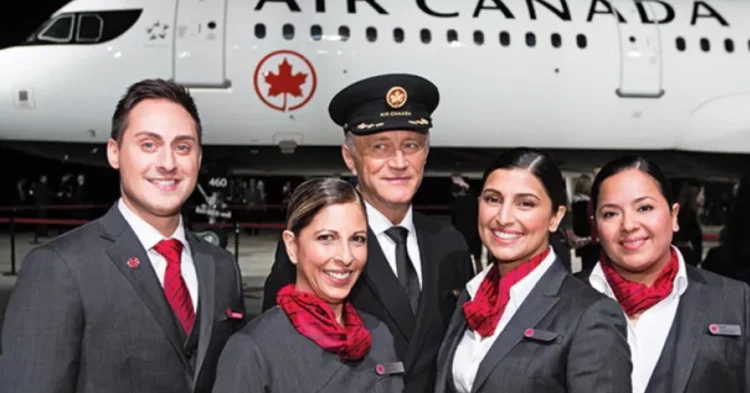Air Canada’s flight attendants are preparing for a possible strike, with negotiations intensifying this week between the airline and the Air Canada Component of the Canadian Union of Public Employees (CUPE). If no agreement is reached, more than 10,000 cabin crew members could walk off the job as early as Saturday, August 17, following a 72-hour strike notice that may be issued as soon as Tuesday, August 13.
The current standoff comes after a decade-long contract expired on March 31, 2024, and flight attendants overwhelmingly voted in favor of strike action. On August 5, CUPE members voted 99.7% in support of striking if necessary — a powerful signal of collective frustration.
Table of Contents
A “Day of Action” at Major Canadian Airports
Flight Attendants Unite in Peaceful Demonstration
As part of their efforts to gain public and employer attention, flight attendants organized a “day of action” on Monday, August 11, appearing in uniform at major airports in Montreal, Toronto, Calgary, and Vancouver at 1 p.m. Eastern Time.
CUPE emphasized that the protest was not designed to disrupt travel. Instead, it served as a silent show of unity, aiming to apply pressure on Air Canada during negotiations while also educating the public on the realities of flight attendants’ working conditions.
Two Goals: Negotiation Pressure and Public Awareness
Labour expert Barry Eidlin, an associate professor of sociology at McGill University, explained the strategy in an interview with CTV’s Your Morning.
“This is a show of unity, a show of strength,” said Eidlin. “It’s meant to increase pressure on the company while also building support from passengers who may not understand what these workers endure.”
Key Issues on the Table: Pay, Unpaid Hours, and Respect
The Fight for Fair Compensation
One of the union’s core demands is compensation for unpaid hours — particularly during critical tasks such as boarding, deplaning, assisting passengers during emergencies, and conducting mandatory safety checks.
“Any of our federally regulated safety checks — we are not compensated for,” explained Shanyn Elliott, co-chair of CUPE’s Mobilization and Engagement Committee, in an interview with CTV News.
This grievance speaks to a broader issue in the airline industry: flight attendants are typically only paid once the aircraft doors are closed, meaning a significant portion of their working day goes unpaid.
Flying Air Canada? Here’s What to Know About the Possible Upcoming Strike
Seeking Respect at the Bargaining Table
CUPE president Wesley Lesosky has been clear about what’s at stake. In a message posted to a website dedicated to the contract dispute, he stated:
“Our goal is to obtain a fair contract. But if the company refuses to come to the table with the respect we’ve earned, we are ready.”
Will Air Canada Flights Be Affected?
What Passengers Need to Know
While the possible strike would affect Air Canada and Air Canada Rouge flights, regional carriers like Jazz and PAL — which operate Air Canada Express routes — would not be directly impacted.
Air Canada, for its part, has downplayed the strike vote, calling it a “normal step in the negotiation process.” However, with the clock ticking toward a potential walkout, travelers are advised to keep an eye on updates throughout the week.
What Happens Next?
High-Stakes Bargaining Ahead
According to Eidlin, resolving a decade’s worth of unresolved issues won’t be easy.
“There’s a lot of issues that accumulate over a 10-year contract that need to be addressed,” he said. “So that’s going to take a high-pressure situation to actually reach a deal.”
With negotiations continuing and strike notice looming, the coming days will be critical. Unless significant progress is made at the bargaining table, Canada could be facing a major disruption in its air travel network — driven by workers demanding recognition, fair wages, and respect for the essential work they perform every day.

